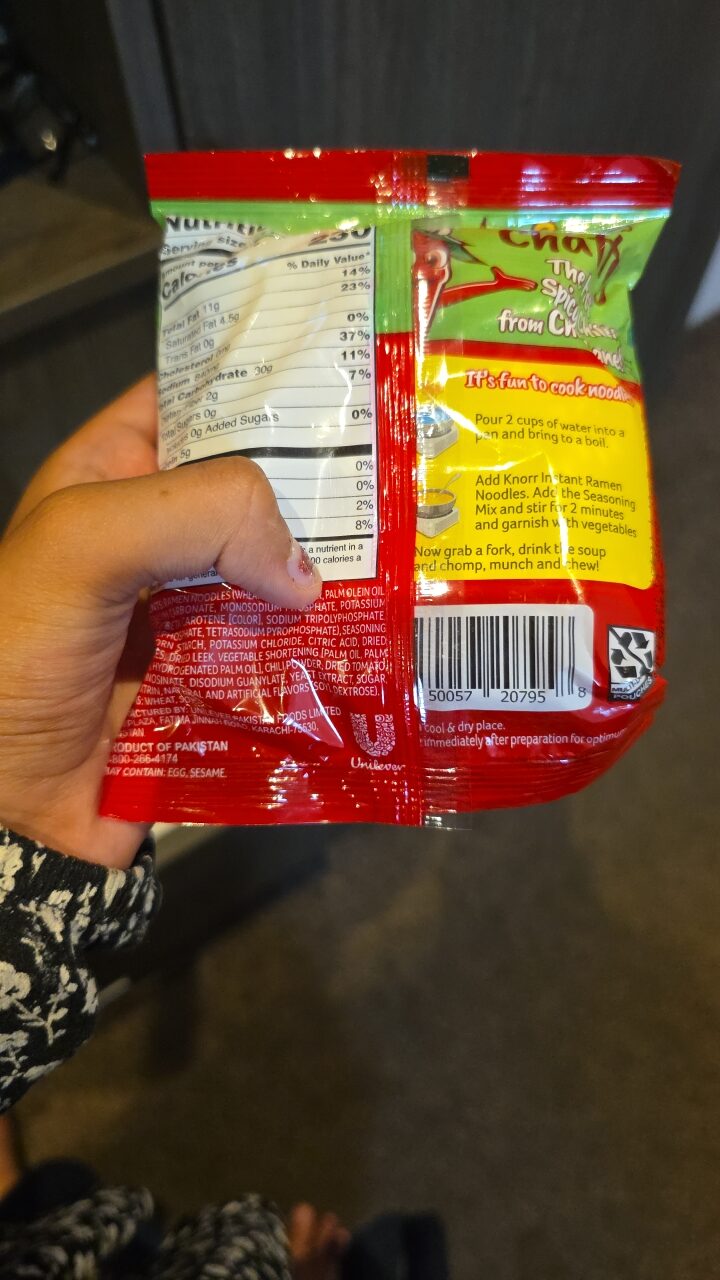
Barcode: 850057207958
Chana Chat Masala
HALAL
📝 Reason: Most ingredients in this product are plant-based or synthetic and Halal. However, ingredients like ‘seasoning’, ‘disodium guanylate’, and ‘artificial flavors’ are doubtful because their origin or processing is unspecified and could involve Haram animal or alcohol derivatives (Quran 5:3, IFANCA). In such cases, the product is considered Doubtful until verified.
🏷️ Category: Instant Noodles
📄 Certificates: The Spicy Chicken Flavour, Product Of Pakistan
Ingredients:
Details
Understanding the Halal Status of Chana Chat Masala
Chana Chat Masala is a popular instant noodle product primarily made with various plant-based ingredients and synthetic additives. And for those who are conscientious about Halal dietary options, the accessibility of Halal products is essential. In this article, we will thoroughly dissect the Halal status of Chana Chat Masala, including details on its ingredients and E-numbers.
Ingredient Analysis
Core Ingredients
- Palm Olein Oil: This oil is derived from palm trees and is considered Halal as long as it is not processed with non-Halal substances. Source
- Wheat Noodles: Made from wheat flour, salt, and water, they are Halal, provided there are no added Haram substances. Source
- Monosodium Glutamate (MSG): A common flavor enhancer, usually derived from fermentation and regarded as Halal unless otherwise indicated. Source
- Potassium Phosphate: This inorganic salt serves as a food additive and is typically considered Halal. Source
- Sodium Tripolyphosphate: A synthetic compound functioning as a preservative and emulsifier, it’s generally accepted as Halal. Source
- Carotene: A colorant derived from plants, such as carrots, and confirmed as Halal. Source
- Sodium Pyrophosphate: Used for texture and as an emulsifier, this synthetic ingredient is also generally Halal. Source
- Corn Starch: A thickening agent sourced from corn, which is Halal. Source
- Potassium Chloride: Another mineral salt that is Halal. Source
- Citric Acid: Generally made from fermented plants, this ingredient is considered Halal. Source
- Dried Leek: A vegetable component that is also Halal. Source
- Vegetable Shortening: Generally derived from plant oils, it is halal unless any animal fats are indicated. Source
- Chili Powder: Made from dried chilis and indeed Halal. Source
- Dried Tomato: This ingredient is Halal as well. Source
- Yeast Extract: Halal and derived from yeast Source
- Dextrose: Commonly sourced from corn or wheat starch, this is generally accepted as Halal. Source
Doubtful Ingredients
There are certain ingredients such as seasoning, disodium guanylate, and artificial flavors that raise questions about their Halal status because their sources are often not specified clearly. These could potentially contain non-Halal components or derivatives from animals, making them ambiguous in terms of their compliance with Halal dietary restrictions.
– Seasoning: This is a generic term and may involve animal or non-Halal derived components Source.
– Disodium Guanylate: This can be derived either from yeast or animal sources and unless specified, its status remains uncertain Source.
– Artificial Flavors: Generally, this category can also include alcohol or animal derivatives if not specified, making it a doubtful ingredient Source.
Conclusion: Is Chana Chat Masala Halal?
In summary, while the base ingredients of Chana Chat Masala appear to be primarily Halal, the ambiguity surrounding the ‘seasoning’, ‘disodium guanylate’, and ‘artificial flavors’ raises some concerns. Until confirmed, the product might be classified as ‘Doubtful’. For those strictly observing Halal dietary laws, it’s advisable to seek clarification from the manufacturer about these uncertain ingredients.
Ultimately, Chana Chat Masala can fit into a Halal diet as long as consumers are aware of these potential doubts. As the product holds the certificate of the Spicy Chicken Flavour, it validates its catering to Halal markets, making it accessible for Muslim consumers, provided they audit the ingredient specifics closely.
